vol.4 Holding a meetup event where industry, academia, and government gather to share issues related to food and create connections
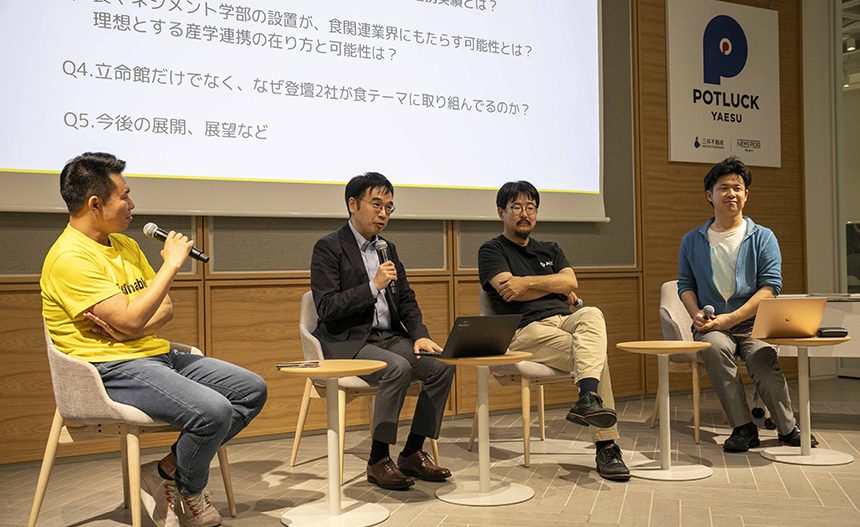
From left: moderator Kei Unno (Representative of Sustainable Food Asia Co., Ltd.), Katsuya Sakai, who was involved in the creation of RIMIX, an entrepreneur support platform at Ritsumeikan University, and Takenoshita, who launched ARK Co., Ltd., which works on closed-circulation land-based aquaculture. Mr. Koyo and Koichiro Miyake, the representative of Naorai, who is working on creating a new distilled alcoholic beverage using Japanese sake as an ingredient in Hiroshima.
&mog by Mitsui Fudosan is a one-stop platform that supports food business development, from concept design to urban implementation. The keyword for this project, which started in Nihonbashi this spring, is “Future food grown in the city.” Mitsui Fudosan is working with partner companies related to food to carry out a variety of activities to create new innovations.
“&mog Kingdom” introduces monthly project events and the latest news. We will report on the new food trends starting in Nihonbashi!
What does the Faculty of Gastronomy Management bring to the food-related industry?
Ritsumeikan alumni and current students gather in Yaesu Midtown!
Recently, a growing trend among universities is green faculties that focus on agriculture, food, etc. The School of Gastronomy Management, established by Ritsumeikan University in 2018, was a pioneer.
Until now, academic studies dealing with food at universities had focused on specialized fields such as home economics and registered dietitian nutrition. The purpose of this department is to support these individual experts and develop them into “conductors of an orchestra” who can be seen from a bird’s-eye view.
The reason behind this is that there are still few people in Japan who are world-class in the food field. Food-related companies that have expanded overseas tend to withdraw because they lack the skills to manage food as a business. Therefore, the Faculty of Gastronomy Management aims to develop human resources who can contribute to solving human problems related to food, based on economics and management, and contribute to the future of Japan’s food industry.
With the launch of the food innovation platform “&mog by Mitsui Fudosan” in March of this year, a special edition of “Sustainable Food Night”, a talk event in collaboration between Mitsui Fudosan, Ritsumeikan University, and Sustainable Food Asia, will be held in May. It was held on the 16th. Participants included mainly graduates and current students of Ritsumeikan University, as well as food-related companies and food-related investment businesses. The group consists of about 50 members who are interested in food innovation across generations. “&mog by Mitsui Fudosan” hopes to use this event in collaboration with its partner company, Ritsumeikan University, to not only stimulate the development of food, but also to play a role in connecting working adults and students.
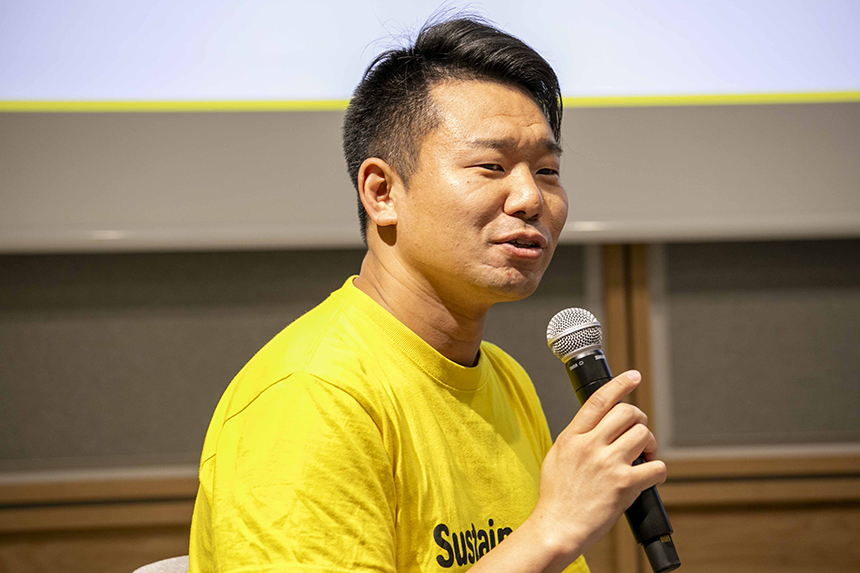
The moderator on this day was Kei Unno, a graduate of Ritsumeikan University who runs “Sustainable Food Camp,” which connects food tech startups in Japan and Asia. In 2020, Mr. Umino, who founded CarpeDiem Co., Ltd., launched Sustainable Food Asia Co., Ltd. to create a new sustainable food industry ecosystem from Asia. Currently, he is active in a wide range of activities, including developing new food ingredients and fruit meat made from jackfruit, and managing the Sustainable Food Museum, a facility that introduces ideas and services from various companies in the food tech field.
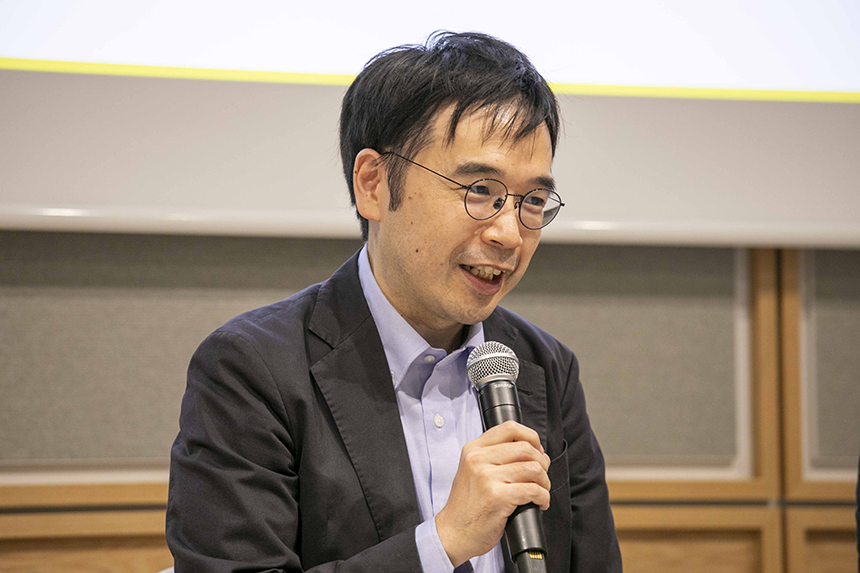
Three unique people, all graduates of Ritsumeikan University, were selected as panelists. The speaker from Ritsumeikan University was Katsuya Sakai, Director of the Finance Department. Ritsumeikan University has launched the Ritsumeikan Social Impact Fund (RSIF), which emphasizes not only economic returns but also the impact it has on society. Many of its investments include food-related projects, and Mr. Sakai has been one of the key players who joined RSIF from its inception and has poured his energy into it. “The duty of a university is to develop human resources, but we also need the work of asset management. So we thought there was a way to link these two, and RSIF was born. RSIF contributes to society while managing assets. You can invest in your business, and the university has a variety of players such as students and researchers and is well-equipped, so you can take advantage of the environment.”
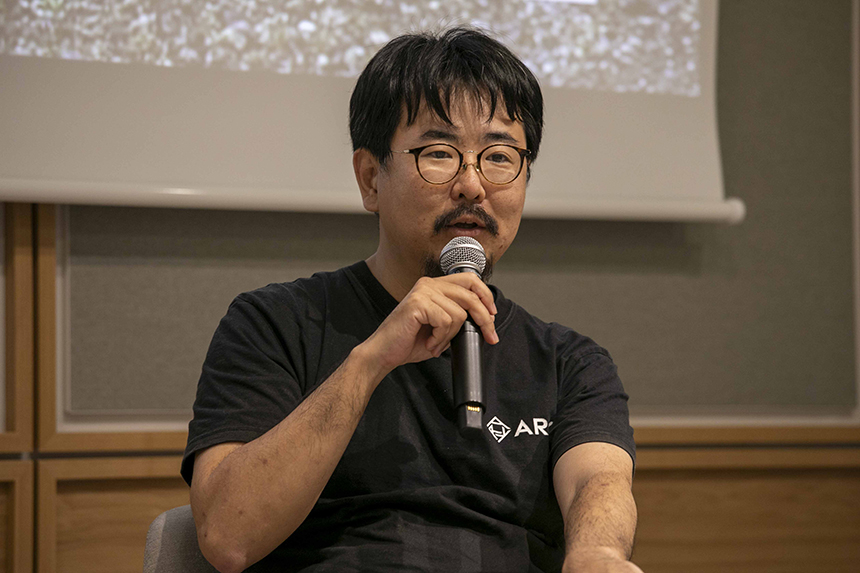
Another speaker, Kouhiro Takenoshita, CEO of ARK Co., Ltd., studied electronic control engineering and mechatronics before transferring to Ritsumeikan University and majoring in robotics and bioengineering. He co-founded ARK in 2020 and developed ARK, a closed-circulation land-based aquaculture system that allows anyone to do aquaculture anywhere. He says his mission is to “democratize aquaculture.”
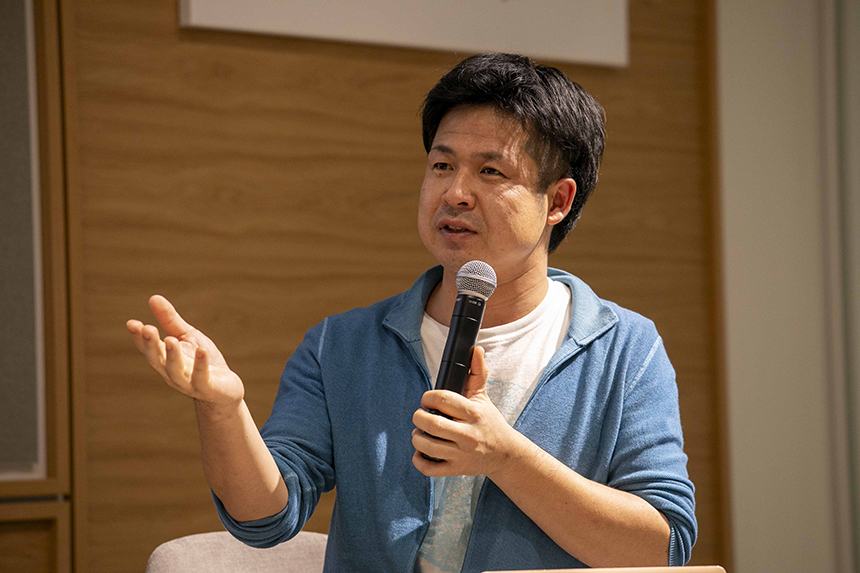
Koichiro Miyake, who attended from Hiroshima, is the representative director of Naorai Co., Ltd. He became interested in sake because many of his relatives were involved in sake breweries, and he worked alone to sell sake in China. Using what he learned there, he established a sake brewery and created a new type of sake, “Jōchū,” hoping to create something that would be accepted around the world. “Jyochu” is a sake that uses a unique patented manufacturing method to extract alcohol from sake without applying heat. By extracting the pure scent and flavor of sake and removing only the water, we discovered a new value in sake that, like whisky, deepens over time. The talk session between these four people, who tackle food issues with unique ideas and techniques, was filled with fun and conversation. The themes were “Why does Ritsumeikan University take on the challenge of solving food issues?” “The possibilities that the establishment of the School of Food Management will bring to the food-related industry, and the ideal form of industry-university collaboration.” Opinions were raised from various standpoints. The participants listened with great interest.
“I am very grateful that Mitsui Fudosan asked me if I would like to work with them.By participating in Mitsui Fudosan’s project to support food innovation, we will be able to foster graduates and current employees working in food-related fields. I would like to continue to do various things with the involvement of students.To that end, today I decided to discuss the matter with them and ask them to come together and develop food together. I would like to liven up the event,” said Sakai.
Also, many of Ritsumeikan’s investments are in food-related companies, but did they have any goals in mind? In response to this question, Mr. Sakai said, “I don’t have any particular intention, it’s just about the results.I understand that this is an impact fund that invests in businesses that address social issues, and that I would like to support alumni in ways that are not limited to food. “I think the reason why this has happened is that the food industry has so much potential.”
“It is said that the food-related market is worth about 100 trillion yen.There is still a lot of room for growth, including adding value to food,” continues Mr. Unno. Also, when talking about how collaboration with universities should be, he said, “In many cases, examples of collaborative efforts with universities are limited to the science part. I think we can work together across departments to figure out how to solve this problem,” says Takenoshita. “It would be great if we could think of Ritsumeikan as a village and conduct demonstration experiments.There are many ideologies in the world, so it would be great if we could start by asking, “What kind of world would you like?” says Miyake.
“From now on, we will be able to interact with many people in a variety of ways, not just food, and not just startups.Universities should be organizations that can respond to this,” says Sakai. Each of the four members has hopes that exciting changes will occur as new perspectives are incorporated into collaboration between industry, government, and academia.
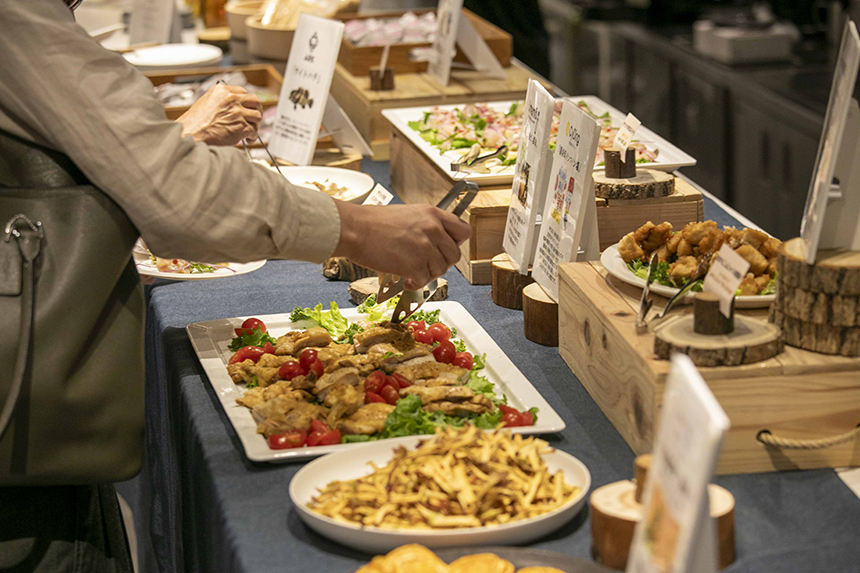
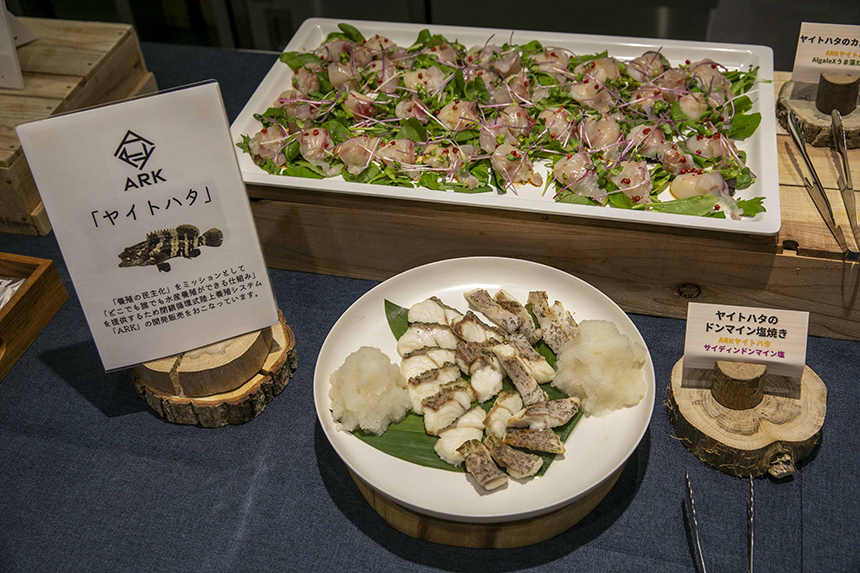
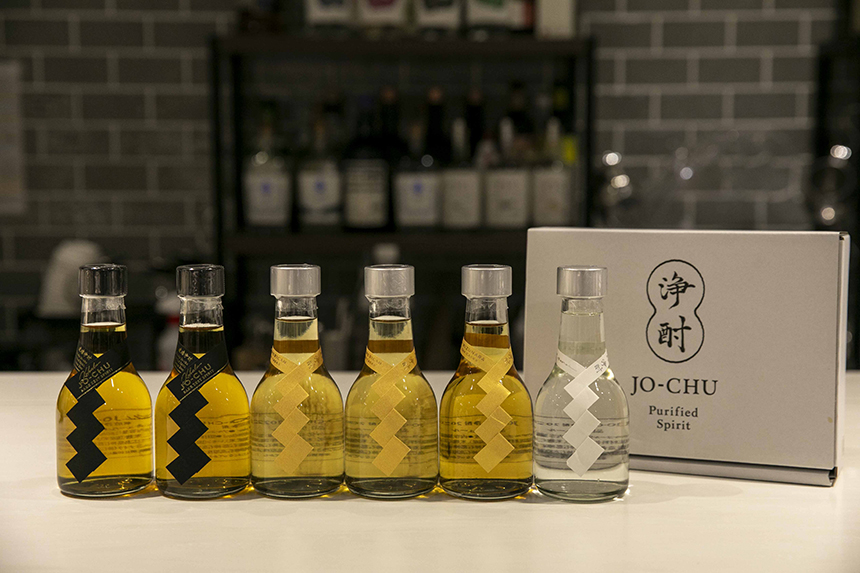
The networking time was complemented by a dinner using new ingredients created by the startup. Mr. Takenoshita's Yaitohata and Mr. Miyake's Jochu were also served.
After the talk session, there was discussion time for participants to divide into small groups and share their opinions, allowing for a friendly networking experience. At the final gathering, a dinner featuring products from 12 start-up companies that are partners of &mog by Mitsui Fudosan, including the panelists’ companies, was lined up.
For example, UMAMI UNITED JAPAN Co., Ltd.’s frittata using 100% plant-based “UMAMI EGG” and “Suji Aonori” by Sea Vegetable LLC, which cultivates seaweed on land and in the sea. , now available as frites with seasonal vegetables. Hearty dishes such as “Karaage made with okara konnyaku” by Table Mark Co., Ltd. BEYOND FREE and chicken thighs grilled using “Umaweed” by AlgaleX Co., Ltd. will also be available. Rice balls made with “red rice” from Nomatech Sdn Bhd. in Malaysia and fruit meat shigureni, which is sold in Japan as fruit meat in collaboration with Nanka Sdn Bhd., and OYAOYA, a brand produced by Agriture Co., Ltd. The soup made with dried vegetables was also popular.
The Yaito Grouper from ARK Co., Ltd., which was served as carpaccio, had a reputation for having a delicious flavor that belied the fact that it was farmed. “Jyochu-Kinshidari,” which is Naorai’s Jochu aged in oak barrels, and “Kohaku Jochu,” which is aged in oak barrels and pickled with pesticide-free lemon peel, are also so popular that there are long lines. The gathering ended in a friendly atmosphere while enjoying delicious food.
Bringing the food industry to “one team”
“Tokyo Food Meetup” connects players across borders
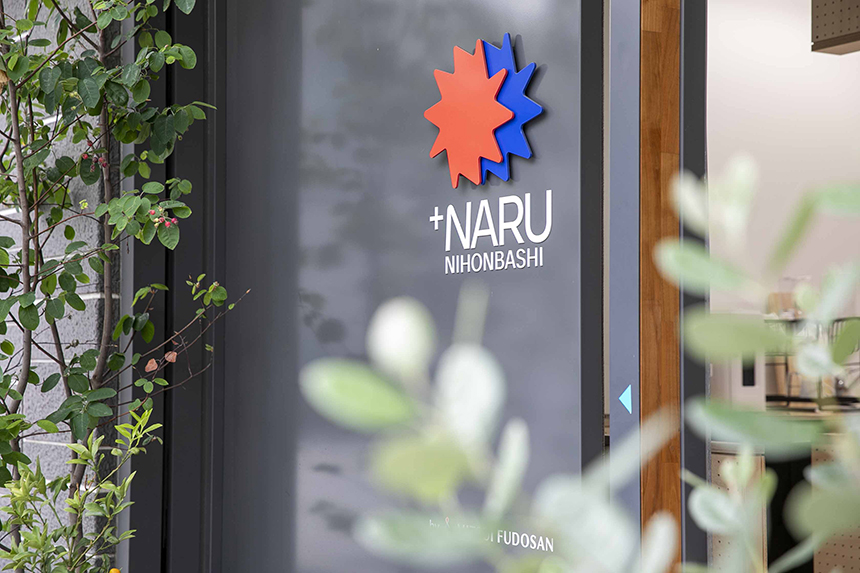
The “Tokyo Food Meetup” is held in parallel with these events, where players in the food industry interact across industry boundaries. This is a place to build a community with carefully selected members, including food startups, people in the Nihonbashi food industry, and teams working on new corporate businesses. The venue for the 6th event held on this day was “+NARU NIHONBASHI by MITSUI FUDOSAN,” an open space in Nihonbashi managed by Mitsui Fudosan. The name of the facility, NARU, has the meanings of becoming (to become something), becoming something (to become something), and ringing (to become known to the public). It was named +NARU with the hope that more thoughts and events would be added to it.
Participants included four startups: ASTRA FOOD PLAN, CANEAT, Daybreak, and Tech Magic, as well as major companies such as Mitsubishi UFJ Financial Group, Isetan Mitsukoshi Holdings, and Yoshinoya Holdings. With a total of about 15 people, it was a more casual and intimate gathering where people could deepen their friendships.
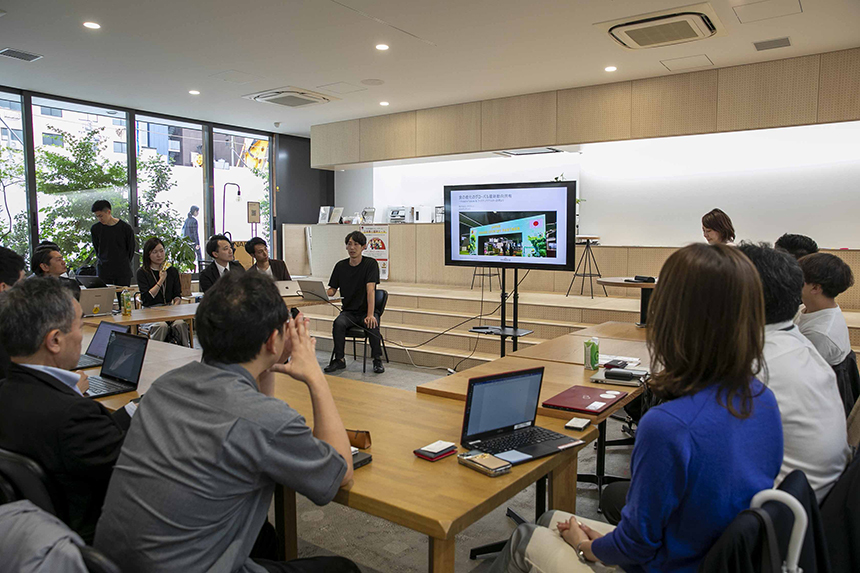
At the opening, Sigmaxis Co., Ltd., a partner of &mog by Mitsui Fudosan, gave a report on their visit to Europe’s largest food tech event, Food 4 Future, which was held in Spain in April. “Food 4 Future” will feature approximately 170 conferences, 10,000 participants, and nearly 500 speakers, with many participants from Japan, demonstrating the increasing attention to Japan’s food industry from overseas. He said he felt it. Sessions that introduced proposals from Japan and what is currently happening in Japan’s food industry were also held, and were said to be popular. It was also reported that in Europe, a system has been established in which innovators in the same field do not compete with each other, but rather work together and collaborate successfully, and concluded that Japan should learn from this. This was followed by presentations by four startups and a talk on the theme of “Technology for solving restaurant issues.”
Nihonbashi restaurant and food tech startup
A place for mutual understanding and encounters
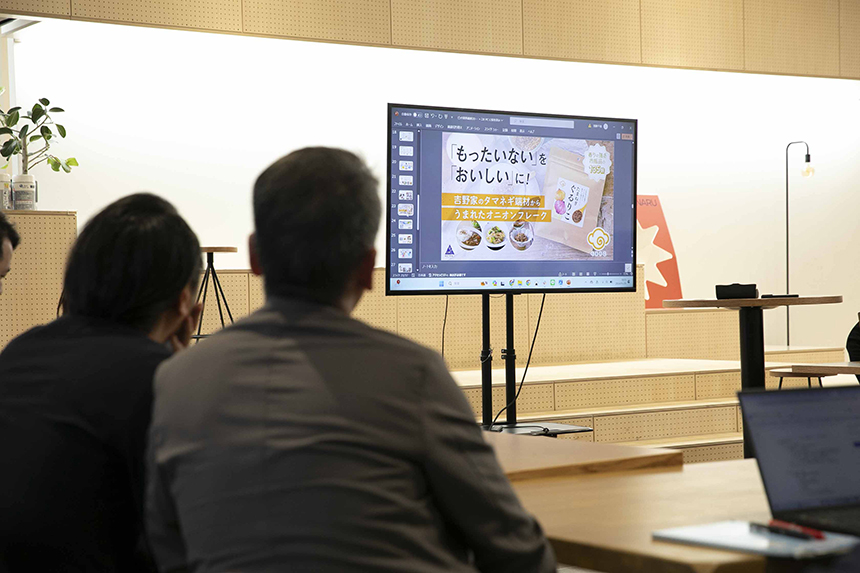
The following four companies gave presentations on this day.
ASTRA FOOD PLAN is a system that uses a superheated steamer to dry and sterilize and upcycle the food that is discarded in large quantities every day as “hidden food waste” into delicious, safe, and high-value-added raw materials in terms of nutritional value. making it possible. The term “hidden food loss,” as the company calls it, refers to substandard crops from production areas and food residue from food factories, which are not included in what is known as food loss in Japan. Focusing on the fact that many food residues are edible, they have succeeded in turning discarded waste into new materials. For example, “Onion Gururiko®”, a dried onion flake made from Yoshinoya’s onion scraps, has 135 times more flavor than regular onion powder, has high nutritional value, and is attracting attention as it is commercially available.
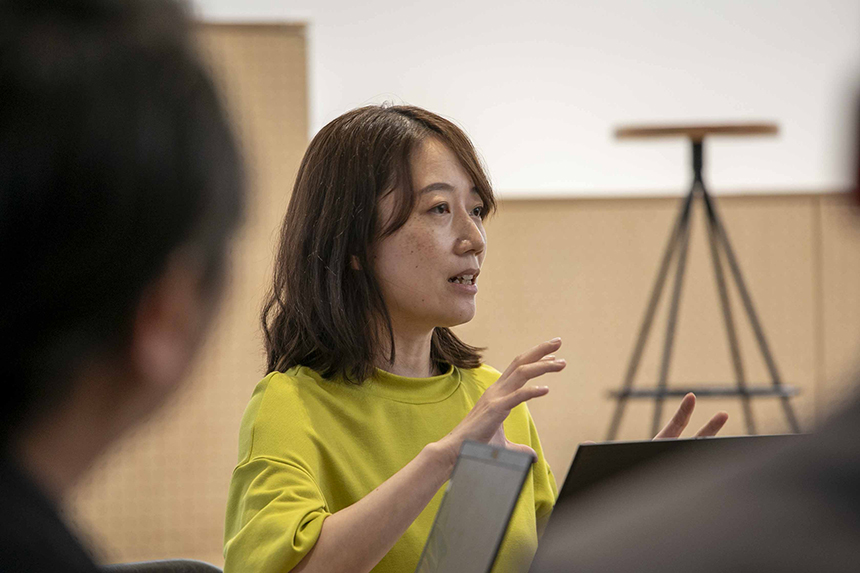
CANEAT, whose mission is to “eliminate allergy incidents when eating out and create an environment where everyone can enjoy food equally regardless of religion or constitution,” provides an allergy hearing system and allergy management services. The Allergy Hearing System is a system that allows you to directly input allergy information of guests for group meals such as school trips and weddings in advance. Accurate information on individual dietary restrictions can be used to improve work efficiency and prevent accidents.
The allergy management service is an app service that allows you to determine allergies and search for menus and processed products by allergen. Allergy information can be displayed accurately by taking a photo of the ingredient label with a smartphone. It is an excellent tool that can accurately and automatically judge notations that are easily mistaken when judged by humans. It is said that even ingredients that are not required to be labeled, such as soybeans and almonds, may actually be present in the ingredients, even though they are not listed on the ingredients label. At CAN EAT, in addition to visual inspections by experts, we also conduct confirmations with the manufacturer on your behalf if necessary, allowing us to make accurate judgments. Another benefit is that it is easy to use, making it possible to streamline the time-consuming process of creating allergy lists and buffet cards.
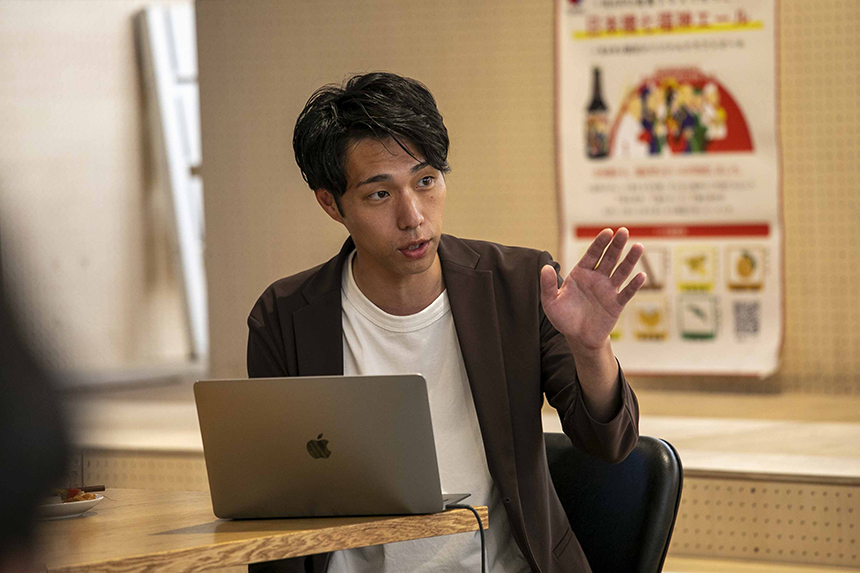
Daybreak is the developer and provider of the special refrigeration machine “Artlock Freezer.” This uniquely developed product uses a micro-wind system that causes minimal damage to food, preventing flavor deterioration due to freezing and preserving freshness and texture. For example, traditional freezing of red sea bream sashimi greatly reduces its flavor, but with the Artlock Freezer, it retains its crunchy texture and taste as close to fresh as possible. Furthermore, it has been found that freezing food in the Artrock Freezer increases the flavor by over 25% compared to raw food. In other words, the goal is to make it “tastier than raw”. The company is also focusing on consulting from the software side, such as the correct storage and thawing methods to make the most of the Artlock Freezer, and business design that takes advantage of special refrigeration.
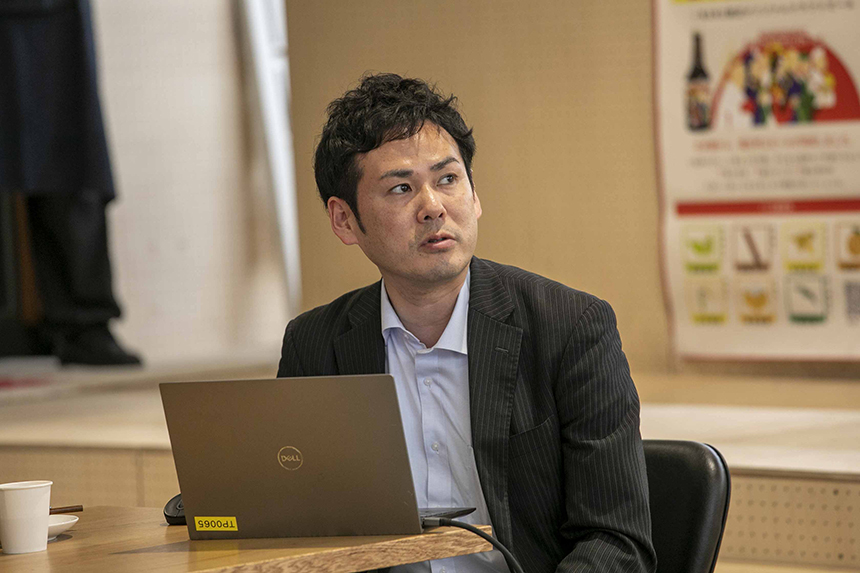
Techmagic, a pioneer in cooking robots, is known for developing the stir-fry cooking robot “I-Robo.” I-Robo can perform dishes that are difficult to control, such as fried rice and stir-fried vegetables, while replicating the skills of a skilled craftsman. The great thing about this is that you can flexibly adjust the rotation speed and direction of the frying pan, which changes depending on the cooking process. Even cleaning the frying pan after cooking is automated, helping to solve the labor shortage problem faced by many food-related companies.
After the presentations, there was a free discussion with these four companies on the theme of “Technology for solving problems faced by restaurants.”
“Tokyo Food Meetup” will continue to be held regularly as a new community venue based in Nihonbashi. It is hoped that the community born in Nihonbashi will become “one team” and lay the foundation for creating the future of food.
■credit
text:Jun Okamoto
photo:Yoshiko Yoda
[Sustainable Food Asia x Ritsumeikan University x Mitsui Fudosan]
[Tokyo Food Meetup]





